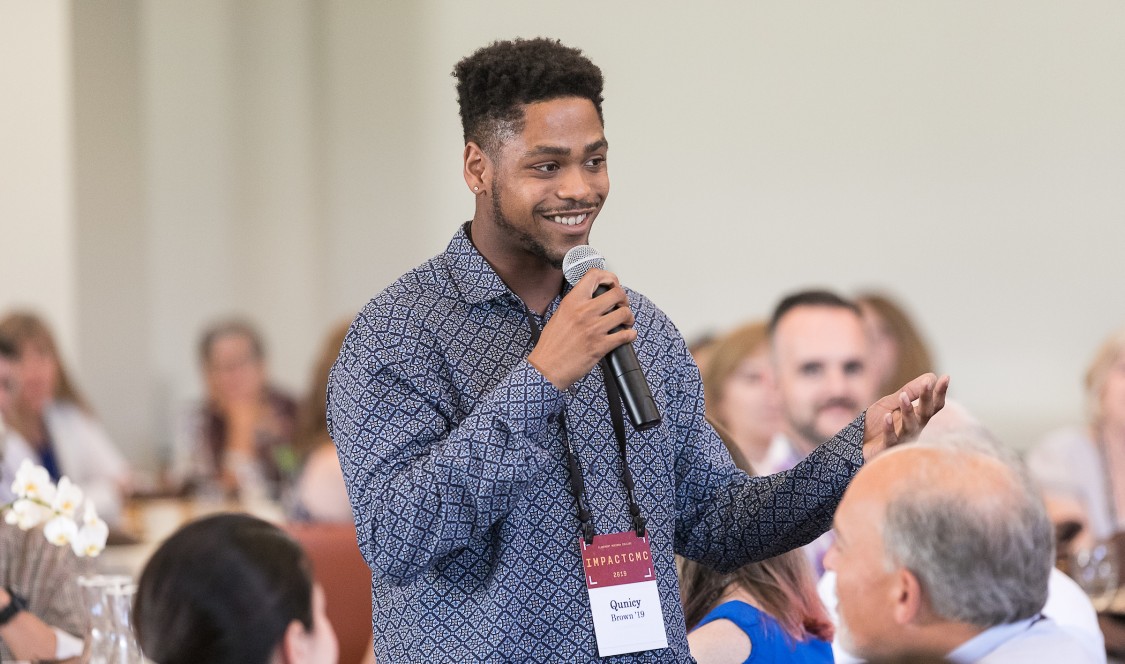Quincy Brown ’19 came of age on Alberta Street—a historically Black Main Street in his hometown of Portland, Ore. He biked and took the bus there as a kid. Proudly visited his grandmother’s house nearby. Showcased his art at the Alberta Street Fair. It “was and still is the cultural center of my northeast Portland neighborhood,” Brown said. When COVID-19 hit, Brown wanted to support local businesses—but he wanted to do so by involving Black community members he felt were “missing from the table” in the now-gentrified area. We All Rise, a Black and woman-led community engagement initiative he helped start this summer, focuses on reinventing spaces across neighborhood commercial districts to help business owners of color. “It's amazing to see that we've helped over 60 entrepreneurs have a retail space for the summer,” Brown said. “From a 7-year-old baker to a seasoned artist, we've brought the soul back to Alberta.”
We talked with Brown, who studied environmental analysis at CMC, about his work with Black vendors in Portland and how his college experience influenced this recent direction.
Alumni in action
- Quincy Brown ’19
- Co-founder, We All Rise
- Portland, Oregon
How did We All Rise come together?
We All Rise came together to provide robust stakeholder and community engagement surrounding the Portland Bureau of Transportation's (PBOT) Safe Streets Initiative. I began working on the initiative as a community member with our historically Black Main Street, Alberta. In our COVID-19 efforts related to supporting businesses, I believed that there were many community members whose voices needed to be heard. When I saw the lack of adequate engagement, I called on my friends who didn't have jobs to assist me. We began to partner with Alberta Main Street, a nonprofit that supports economic development and equity programs. As we worked together to hold the city accountable, we saw a unique opportunity to create a firm that modeled such equity strategies. Our firm looks to deepen the integrity of community-based projects. We also look to provide a grassroots micro-economic approach to sustainable Main Street development.
How does We All Rise intersect with the work you’ve done at CMC—and ultimately want to pursue?
During my freshman year at CMC, I had a fellowship with the Mgrublian Center for Human Rights where my project explored displacement and gentrification in the Alberta Arts District. I argued that vast human rights violations were at play—that pushing people out of their neighborhoods was part of a national environmental justice crisis. A portion of my research focused on Alberta Street and I interviewed those who had left. This current work models a different effort. We are actualizing reentry through micro-enterprise—empowering small businesses and giving them retail space in a time of need. Now, community members come to support their friends and families. We believe that small business development is the key to recovery. When we create programs that realize inequalities, we can begin to rewrite the wrongs of history.
What has been the most satisfying part in seeing this come together over the summer? What has been the response from both business owners and the community?
It's been life changing to apply all the research I conducted over the past five-plus years. Most of my projects at CMC directly focused on community development. I utilized the 5C curriculum to study environmental science, urban planning, history, race and ethics, and economics. Bringing all of these fields together during an intersectional crisis like a global pandemic is something I never thought I'd be doing. Many of the projects I've worked on this summer—like closing a street down for socially distanced seating, creating a socially distanced farmers market from scratch, delivering over 30 free seating units to restaurants, or supporting micro-enterprise development on a neighborhood Main Street project—I could have only dreamed about doing.
I'm proud of the fact that during a crisis, my community stepped up, worked together, and developed tactical solutions. Our programs have created a cultural shift. So many community members who once enjoyed the street are back. We've modeled a successful, tactical urbanism project that supported the reentry of a previously displaced Black community—all while maintaining social distance regulations.
Do you see this continuing through and beyond the pandemic? What is the larger goal?
This will 100 percent continue past the pandemic. We want to continue the momentum and ensure that we—as a city, state, and nation—move forward equitably. As we empower more people to actively participate in their communities, we will truly see change. We also recognize that our company is modeling an important case study that can be used at a larger scale. For instance, We All Rise is in partnership with the National Main Street Center in Chicago to continue to model successful equity projects.
Is there anything from your CMC experience that you are relying on most to help We All Rise build partnerships?
I was an event planner for a lot of my time at the 5C’s. This involved getting approval from campus security, deans, and RA’s to create tactical changes in the college environment. We also worked with local and national artists, event planning companies, and sponsors to build large-scale events. I remember having to present at each college to ask for funding, and I really value that cross-campus experience. I would not have been able to navigate the extreme bureaucracy related with public projects without it. Now, I feel empowered by those previous experiences at CMC.
I’m also super thankful for the classes I took with professors Lily Geismer and Gaston Espinosa. I learned extremely important lessons related to spatial justice and civil rights activism. My two most important classes at CMC were Race and the American City and Race, Religion, and the Civil Rights Movement. Combining those classes at CMC with my urban planning studio classes—which focused on sustainability, public health, and community development—armed me with the tools I needed to best support my neighborhood.
—Thomas Rozwadowski

